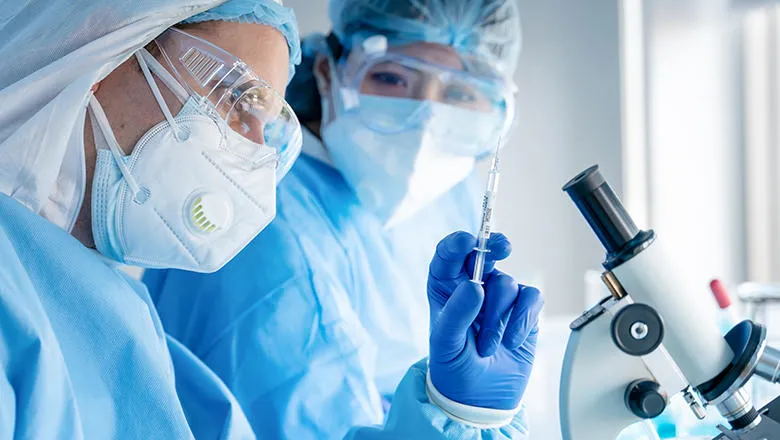The potential role that robust immunisation programmes have in cutting child mortality in parts of the developing world is enormous and matched only by the need for urgent action. By harnessing the cutting-edge research coming from institutions such as King’s we can make a real impact on the lives of individuals most at risk of deadly but preventable disease."
Professor Harris Makatsoris
30 November 2023
King's engineers tackle global outbreaks as part of new £10 million vaccine hub
Led by Imperial College London, King’s joins a coalition of academia and industry to distribute vaccines to developing world.

The Department of Engineering has joined a newly established research Hub built to improve global immunity to infectious disease through the production and distribution of vaccines in middle and low-income countries (LMICs).
The new Future Vaccine Manufacturing Hub will involve representatives from the Department of Engineering, Imperial College London and the Universities of Bristol and Strathclyde amongst others, and establish new vaccine manufacturing projects in Vietnam, Bangladesh, South Africa, and the UK. It will be funded by a £10.5 million grant from the Department for Health and Social Security and the Engineering and Physical Sciences Research Council, the latter of which will manage the program.
Lack of access to vaccines is currently one of the largest causes of death amongst children under five. The Center for Disease Control and Prevention estimates that one in five children globally do not have access to essential vaccines, and that more than 50 million deaths could be prevented between 2021 and 2030 through immunisation.
However, effective distribution of vaccines is hampered in rural areas of low- and middle-income countries by the costs associated with the production and purification of vaccines, as well as the need for doses to be stored in refrigerated conditions which are often unavailable.
Furthermore, vaccine infrastructure needs to be able to adapt and rapidly respond to emerging threats in such areas, including avian influenza, novel coronaviruses, Ebola and anti-microbial resistant bacteria.
Professor Harris Makatsoris, Professor of Sustainable Manufacturing Systems in the Department of Engineering and King’s lead on the project said that there are two major challenges facing future vaccine manufacturing systems in these areas.
“Ultimately vaccine production needs to be able to meet the specific challenges of the area in which doses are being distributed. In LMICs where cost is a significant barrier and new infectious threats are constantly being identified and need to be responded to quickly, production, stabilisation and storage systems need to be both rapid and cheap enough for local communities can use them.
“This is why the hub is experimenting with augmented, next- generation synthetic vaccines which can be rapidly manufactured, as well stabilisation techniques that preserve vaccines without the need for refrigeration. The part King’s will play in addressing this is to develop new methods to debottleneck manufacturing and control of these new vaccines. We’ll build on recent work on manufacturing cost-effective mRNA vaccines to accelerate the creation of future production and distribution platforms in the third world.
Through the establishment of the Future Vaccine Manufacturing Hub we are looking to exploit the next wave of biotechnology innovation to rapidly respond to emerging outbreaks and empower countries most at risk to infections to meet their local vaccine needs.”
Professor Robin Shattock, Chair in Mucosal Infection and Immunity at Imperial College London
“The potential role that robust immunisation programmes have in cutting child mortality in parts of the developing world is enormous and matched only by the need for urgent action. By harnessing the cutting-edge research coming from institutions such as King’s, it’s my hope that the Future Vaccine Manufacturing Hub can make a profound and positive impact on the lives of individuals most at risk of deadly but preventable disease.”
Reflecting on the projected impact of the hub, Project lead investigator, Professor Robin Shattock, Chair in Mucosal Infection and Immunity at Imperial College London, said: "Through the establishment of the Future Vaccine Manufacturing Hub we are looking to exploit the next wave of biotechnology innovation to rapidly respond to emerging outbreaks and empower countries most at risk to infections to meet their local vaccine needs.”
The hub will ultimately serve as one of four under the UK Vaccine Network (UKVN) Project, which aims to develop vaccines for diseases with epidemic potential in LMICs.
In addition to partnering with Imperial, Bristol and Strathclyde, King’s will also work with UK institutions the Centre for Process Innovation, and Medical Health Regulatory Authority as well as industry partners GSK Vaccines Institute for Global Health, Cytiva, Centillion Technology Ltd, Sartorius, and Fuji Film Diosynth Biotechnologies. Manufacturing research projects will be carried out with the following partners: Incepta, Bangladesh; and VABIOTECH, Vietnam; and BioVac, South Africa.

